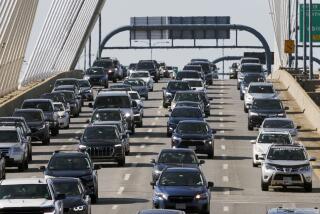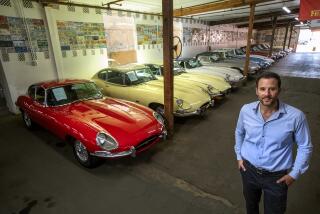Independent Auto Dealers Tap Discount Niche in Japan : Trade: Japanese firms are selling American cars at prices lower than U.S. auto makers charge.
TOKYO — Japanese entrepreneur Yasuyuki Nambu wants to become a big-time importer of American cars. So just weeks after the Clinton Administration waged a bitter battle to win greater foreign access to Japan’s auto market, are Detroit’s Big Three applauding his high-profile efforts?
Don’t bet on it.
Nambu--who first made a big splash selling imported designer clothes at discount prices--is among the most famous of Japan’s buck-the-system “parallel importers.” His strategy is to buy new cars off American dealers’ lots, put them on ships and sell them here cheap. By eliminating middlemen--and the car manufacturers’ own representatives in Japan--he thinks he can make money undercutting the standard sticker price by as much as 29%.
But it’s a sensitive business. Asked for more details on how he gets his cars, which will go on sale next month, he quickly replied: “It’s a secret.”
David Flanagan, director of planning for General Motors Japan Ltd., didn’t hesitate to explain why: It’s a violation of GM’s U.S. dealers’ contracts to knowingly sell vehicles for export.
“If the dealer is operating in violation of that agreement, we have the right to take certain actions against that dealer, and we are doing that,” Flanagan said. “There are some egregious cases where the volume [of export-bound sales] going through these [U.S.] dealers is a substantial amount of money, and there is certainly the possibility the franchise could be terminated.”
Flanagan explained that General Motors finds competition from independent auto importers in Japan “very disruptive” because these entrepreneurs generally operate with low overhead, do not set up service networks, do not have special training to do repairs on foreign vehicles and are not contributing to advertising costs.
General Motors sells cars here through the Japanese-owned Yanase dealership chain, which runs 700 service garages throughout the country along with its chain of showrooms. A Cadillac carries a sticker price at Yanase of about $77,000.
Nambu says he can buy Cadillacs in the United States for $42,000, and that he will sell them in Japan for about $55,000--undercutting Yanase by more than $20,000 and still making a decent profit. Operating out of three showrooms--one each in suburban Tokyo, Osaka and Kobe--he aims to sell a total of 1,000 GM, Ford and Chrysler vehicles during his first year of operation, he said, adding that he wants to sell 10,000 cars in his first five years.
Such goals make Nambu a big-time player in a field entered until now primarily by small importers.
Makoto Otsuka, president of Otsuka Brothers Automobile Co., another independent importer of cars, is a member of the 15-firm World Import Car (WIC) group. This association takes orders from member companies and imports a dozen or more cars at a time, which helps reduce shipping and customs expenses.
WIC takes a 4% profit margin and dealers take another 10%, he said. WIC members get Cadillacs in Los Angeles for about $45,000 and sell them in Japan for $57,000, he said.
“If General Motors sold Cadillacs for $57,000, they could sell more,” Otsuka said. “But they sell at $78,000. It’s too expensive. That’s why they can’t sell. Because the price is high, they don’t sell much, and their profit isn’t much after paying overhead.”
Nambu plans to set up a separate auto subsidiary soon. But for now, his car import business is being handled by an auto division under Designers Collezione, his clothing import firm.
Sanii Kanazawa, director of this division, said there have been no major problems so far buying cars, which are purchased by American employees in Oregon.
But the U.S. dealers want to keep their identities secret because “the Big Three don’t want them to sell their cars to parallel importers,” he said.
While he speaks only limited English, Nambu, 43, moved with his family to Greenwich, Conn., eight years ago, and spends much of his time there, although he is still a Japanese citizen and his business headquarters remain in Tokyo. He attributes part of his freewheeling business philosophy to what he has learned in the United States, where he reads daily translations of American newspapers and notes how schools encourage individuality in his children.
“I [initially] thought the Big Three would welcome my business to sell more cars in Japan and would encourage me to do it,” he said.
“If they’re reluctant to cooperate, I think there’s something wrong on their side.”
While GM is open in its opposition to Nambu’s plans, a Ford official in Tokyo, who asked not to be identified, said simply that “we don’t make comments about parallel imports.”
Chrysler spokeswoman Kaori Kato said the chain of garages that services cars imported by Chrysler Japan Sales Ltd. refuses to work on vehicles brought in by independent importers because “we cannot be responsible” for cars imported by others.
This means buyers of such cars may have trouble getting good service, she noted. “We don’t like for consumers to have the impression that after-sales service isn’t good, because of the actions of the parallel importers,” she complained.
Nambu thinks he has found at least a partial answer to the service dilemma. His firm has signed contracts with 600 garages across Japan that have tow trucks and are willing to service American cars, he said.
Under some circumstances, his company will pay the towing bill. But more important, he said, buyers will get a nationwide list of these garages.
“This kind of service was lacking for other independent importers,” he said. “This is why I’ll succeed.”
Chiaki Kitada of The Times’ Tokyo bureau contributed to this article.






